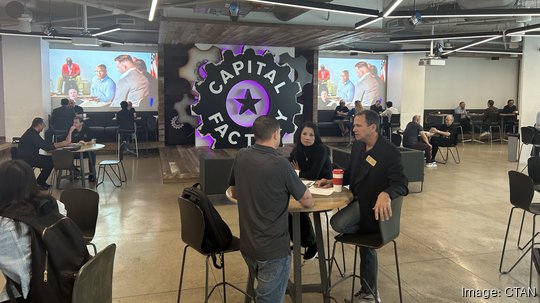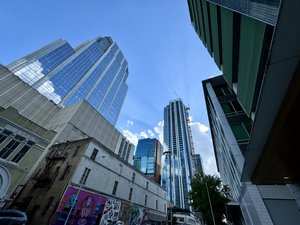
The glory days of startup funding in Central Texas appear to be over, at least for now. The record highs of 2021 and 2022 are fading in the rearview mirror.
Austin area startups raised just $596 million across 74 deals in the second quarter. That may sound like a lot, but it represents a steep decline in venture funding for local companies. It was the worst quarter, in terms of dollars raised, since the third quarter of 2018, according to a new report by PitchBook and the National Venture Capital Association.
The number of deals also represents a big drop off. There are typically over 100 deals per quarter in the metro, and you have to go back to the third quarter of 2020, when 71 funding events were logged, to find a lower deal count.
Quarterly reports can sometimes make things look worse than they are if big funding rounds happen to land just outside the three-month timeframe. But in this case, Austin's downbeat second quarter followed a slow first quarter as well. Austin startups landed $728 million across 79 deals in the first quarter.
Austin's not alone. Venture funding has been down across the country when compared to the high-flying early pandemic years when interest rates were lower and venture firms were passing out term sheets at a rapid pace as new technologies such as autonomous vehicles, artificial intelligence and blockchain were finding a foothold in the market.
Those days appear over, at least in the near term. And that means founders need impressive traction, promising tech and low overhead to entice investors to make bets.
"Regardless of cause, the initial flood of investment into these technologies has largely abated, and now investors are focused on supporting their most promising companies to maturity amid a historically challenging exit environment," NVCA President and CEO Bobby Franklin stated. "This has meant more inside and continuation rounds with valuations under unprecedented levels of scrutiny."
Still, there are exceptions to this new normal. Four local companies raised rounds of $35 million or more in the second quarter. Here's a look at the top deals listed in the report.
- CesiumAstro, a space communications startup, raised $65 million.
- Function Health, a newly-launched personal health and wellness company, landed $53 million.
- Fox Robotics, which makes robotic forklifts, secured $35 million.
- Coder, a startup that has a platform to simplifiy coding environments, also raised $35 million.
The funding slump, in Austin and across the United States, has also been accompanied by fewer tech exits such as initial public offerings and acquisitions. PitchBook's team said that while exit value is pacing better than both 2022 and 2023, the market is still facing its lowest exit total since 2016.
"Despite the high-profile debuts of Rubrik and Ibotta, the tech IPO pipeline has yet to begin to open up," the report said. "No tech unicorns have filed for an IPO since the Ibotta debut. In the year to date, just 37 companies have gone public, a pace just slower than the past two years."
While Austin's startup funding deals are down, the U.S. market has seen a slight upswing.
Startups across the country raked in $55.6 billion in the second quarter, the report showed. That's the biggest haul since the 2022 second quarter. It's also a big step up from the $37.8 billion raised in this year's first quarter.
But the money isn't being distributed equally across sectors. Perhaps unsurprisingly, investors have been fixated on AI. Nearly half of all the funding allocated from April to June went to AI companies. And a good chunk of the quarterly total came from the $6 billion series B raised by Elon Musk's xAI and the $1.1 billion raise for CoreWeave, which was followed closely by a $7.5 billion debt facility.
Investment firms have seen a slowdown as well. U.S. firms secured $37.4 billion in the first half of the year across 255 funds, with a significant share of that going to just a couple big VCs. Andreessen Horowitz raised $7 billion and Norwest Venture Partners and TCV each raised $3 billion funds.
In Austin, there have been several good signs in the venture market. Elsewhere Partners and Ironspring Ventures each raised big funds. And SEC filings show that Gigafund, which is known for backing Elon Musk's companies, is raising three new funds that have a targeted total of $140 million. And 8VC's new AI Fund I raised $24.5 million in late May.
Still, most signs point to a tough road ahead for startup founders, as well as venture firms trying to raise new funds.
"The narrative will eventually shift from 'wait and see' to 'buy the dip,' but the primary question is 'when?' Many startups are nearing the ends of their runways as the equity financing market remains stagnant," the report said. "This could be an opportune time for VCs with ample dry powder to start deploying capital at attractive price points, but only if interests align. Companies may need capital but are unwilling to raise a down round, while VCs want a larger stake for a lower price. The fundraising market will also take some time to adjust."







